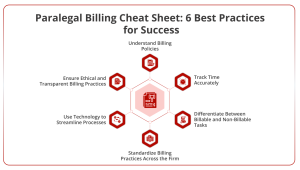Mastering billing practices is essential for maintaining your firm’s reputation and profitability, whether tracking time, avoiding block billing, or ensuring compliance with state-specific regulations.
Destination CLEs conferences will help you fulfill your continuing legal education (CLE) requirements. Held across various locations, these events combine immersive learning with the opportunity to explore exciting destinations.
Billing for Paralegal Work: What’s Included?
Paralegals play a crucial role in law firms, and their services can often be billed to clients. However, not all tasks performed by paralegals are billable. According to Guideline 8 of the ABA Model Guidelines for the Utilization of Paralegals, lawyers are permitted to include charges for paralegal work when determining fees or billing for legal services.
| Billable | Non-Billable |
| Document review and preparation | Administrative/Clerical Tasks such as copying, scheduling, or creating invoices |
| Legal research and drafting | General Office Maintenance |
| Discovery and investigation | Technology Setup and Troubleshooting |
| Case management and trial preparation | |
| Client communication and correspondence | |
| Record keeping and file organization | |
| Legal database searches | |
| Deposition and hearing support |
To ensure compliance, follow the ABA Model Guidelines for utilizing paralegals and your local state bar rules. Market conditions determine paralegal billing rates and vary based on education, experience, and geographic location. For example, specialized certifications and seasoned paralegals may command higher rates. The average U.S. paralegal rate is $29.37 per hour, but specific local associations can help you determine accurate rates for your area.
How Paralegal Billing Improves Law Firm Operations?
Here’s how paralegal billing can benefit your law firm:
Increased Efficiency and Productivity
Paralegals handle many substantive legal tasks, freeing up lawyers to focus on more complex legal work. Correctly billing for their services ensures that every effort is accounted for, leading to a more streamlined workflow.
Improved Cost Management
Billing for paralegal services allows you to manage costs more effectively. Since paralegals work at a lower hourly rate than attorneys, delegating tasks to them can reduce overall expenses without compromising quality.
Enhanced Case Management and Preparation
Paralegals play a vital role in case preparation by conducting legal research, drafting documents, and organizing case files. Accurate billing for these tasks ensures transparency and showcases their value to your firm.
Ability to Handle a Higher Volume of Cases
Your firm can handle more cases without overburdening your attorneys. This increases your firm’s capacity to take on new clients and expand your practice.
Increased Specialization and Expertise
Experienced paralegals often specialize in specific legal areas, allowing your firm to offer more comprehensive services. Accurate billing reflects the specialized skills they bring to your cases and reinforces the professionalism of your team.
Improved Client Satisfaction
Clients value transparency and efficiency. By correctly billing for paralegal services, you demonstrate professionalism and fairness, which can enhance client satisfaction and foster long-term relationships.
Exploring Legal Billing Methods: What Works Best for Your Firm
Let’s explore the most common billing methods and how they can be applied to your practice.
Fixed or Flat Fee Billing
With fixed or flat fee billing, you charge a set amount for handling a case, regardless of the time spent. This method is ideal for cases with predictable workloads and clearly defined steps.
Flat fee billing works well for legal areas where you can estimate the effort involved, such as real estate transactions, estate planning, and bankruptcy. Rely on data, past experiences, or industry benchmarks rather than intuition to implement this method. Legal billing software can help you track tasks and ensure your work meets the agreed flat fee.
Hourly Billing
Hourly billing is one of the most common methods used in law firms. You charge clients based on the time spent working on their cases. Each hour (or fraction of an hour) worked is tracked and multiplied by your set hourly rate to determine the total bill.
This method works best for cases where the workload is unpredictable or requires continuous effort, such as family law, probate law, civil litigation, and business law. For instance, if your hourly rate is $200 and you spend five hours on a client’s case, their bill would be $1,000.
Contingency Fees
In this model, you only get paid if you achieve a successful outcome for your client. You’ll earn a percentage of the settlement or award in the case. Contingency fees are commonly used in personal injury cases, workers’ compensation, and employment law.
While this method offers the potential for high earnings, it also carries risks. If the case isn’t successful, you won’t get paid. To minimize risks, research similar past cases to gauge success probabilities and understand the potential settlement value before committing to this model.
Contingency billing attracts clients who may not have the resources to pay upfront and can build trust by aligning your interests with theirs.
Retainer Fees
Retainer fees involve clients paying you in advance to secure your services. This upfront payment ensures your availability and commitment to their case. Retainer fees are often used in family, criminal defense, or employment law. There are certain types of retainer fees.:
- Replenishable Retainers (Evergreen Retainers): Clients deposit funds upfront, and the balance is replenished as it is used.
- One-Time Retainers: A single upfront payment covers the work, and additional fees are added only if additional costs arise.
Retainers provide financial security and help you manage client workload expectations. However, it’s essential to communicate how funds will be used and whether any unused portion will be refunded.
Paralegal Billing Cheat Sheet: 6 Best Practices for Success
Here are six best practices to master attorney billing and streamline your processes.
Understand Billing Policies
Every law firm has unique billing guidelines, and it’s crucial to familiarize yourself with them. Know the firm’s preferred billing methods—hourly billing, flat fees, contingency billing, or retainers.
- Hourly Billing: Track time in precise increments (e.g., six minutes or 1/10th of an hour) and document tasks with sufficient detail.
- Flat Fee Billing: Understand the scope of the case and use software to ensure work aligns with the predetermined fee.
- Contingency Billing: Assess case histories and potential outcomes to gauge financial risks.
Understanding the policies ensures consistency in invoicing and compliance with the firm’s expectations.
Track Time Accurately
Record tasks as you complete them to prevent missed billable hours or discrepancies. Avoid block billing, where multiple tasks are combined under one-time entry. Instead, break them down: For example, you can consider a drafted motion: 1.5 hours and if reviewed evidence: 2.0 hours.
Provide concise yet detailed descriptions. For instance, write “Phone call with the client regarding deposition schedule” rather than “Phone call.”Utilize time-tracking software to automate and simplify this process, ensuring that all billable hours are captured accurately.
Differentiate Between Billable and Non-Billable Tasks
Not all tasks performed by a paralegal are billable. It’s essential to distinguish between legal work that can be invoiced and administrative duties that cannot. Track non-billable time for internal reporting. Many billing tools allow you to record non-billable activities as “no charge” entries, maintaining transparency with clients.
Standardize Billing Practices Across the Firm
Consistency in billing practices reduces errors and confusion. Implement firm-wide standards for time-tracking increments (e.g., six-minute intervals) and task descriptions that are clear, concise, and client-friendly.
Using cloud-based billing software can help standardize processes, ensuring that attorneys, paralegals, and support staff are aligned in their approach to billing.
Use Technology to Streamline Processes
Billing can be time-consuming, but using the right technology can make it efficient and error-free. Modern billing software offers features like:
- Automated Time Tracking: Record billable hours directly from tasks, calendar events, or communications.
- Custom Rates: Set different rates for attorneys, paralegals, and support staff.
- Automated Invoicing: Generate and send invoices to clients promptly.
- Payment Processing: To ensure timely collections, offer clients multiple payment options, such as credit cards, ACH, or e-checks.
Popular tools like Clio or PracticePanther are designed to simplify billing workflows and reduce administrative burdens.
Ensure Ethical and Transparent Billing Practices
Maintaining ethical billing practices is essential for upholding your firm’s reputation and client trust. Adhere to the ABA Model Rules of Professional Conduct, specifically Rule 1.5, which governs the reasonableness of legal fees.
Be clear and upfront with clients about billing terms and conditions. Avoid padding invoices with unnecessary or vague charges. For example, always ensure task descriptions are specific, such as “Prepared evidence packet for trial: 3.0 hours,” rather than generic phrases like “Worked on case.” Transparency promotes trust and minimizes disputes.
Addressing Technology Advancements in Law Through CLE
Participating in CLE conferences is an excellent way for lawyers to stay updated on the legal industry’s latest technological advancements. From emerging software to automation tools, these conferences provide valuable insights into innovations that streamline daily operations, improve client communication, and enhance efficiency.
Billing in law firms requires adherence to compliance standards, ethical guidelines, and client-specific requirements. CLE programs often include sessions that address these challenges
Staying informed about these advancements ensures your firm remains competitive and adapts to the evolving demands of the profession.
Fulfill Your CLE Requirements in Stunning Locations With Destination CLEs
Destination CLEs redefine the way legal professionals meet their continuing education requirements. Our conferences blend educational opportunities with cultural immersion in some of the world’s most captivating cities.
Why Choose Destination CLEs?
- Meet CLE Requirements: Fulfill your mandatory CLE credits through engaging, high-quality seminars in stunning global locations.
- Transformative Learning: Turn the usual lecture-based learning on its head by engaging in sessions as dynamic as the destinations.
- Networking Opportunities: Connect with peers worldwide, expanding your professional network in settings that encourage collaboration and growth.
- All-Inclusive Experience: Enjoy comprehensive packages that cover educational sessions, accommodations, and unique cultural experiences, making your learning adventure seamless and memorable.
- Efficient Credit Earning: Earn required CLE credits efficiently, with schedules that balance professional development and exploration.
Plan your next educational journey with Destination CLEs and ensure extraordinary professional development. Our 2025 lineup includes diverse locales such as Dublin, Ireland, Dubrovnik, Croatia, and an Alaska Cruise—each offering a distinct blend of legal education and local culture.
Secure your spot today and become part of a community dedicated to professional growth and networking.
DestinationCLEs.com is a participant in the Amazon Services LLC Associates Program, an affiliate advertising program designed to provide a means for sites to earn advertising fees by advertising and linking to Amazon dot com.











